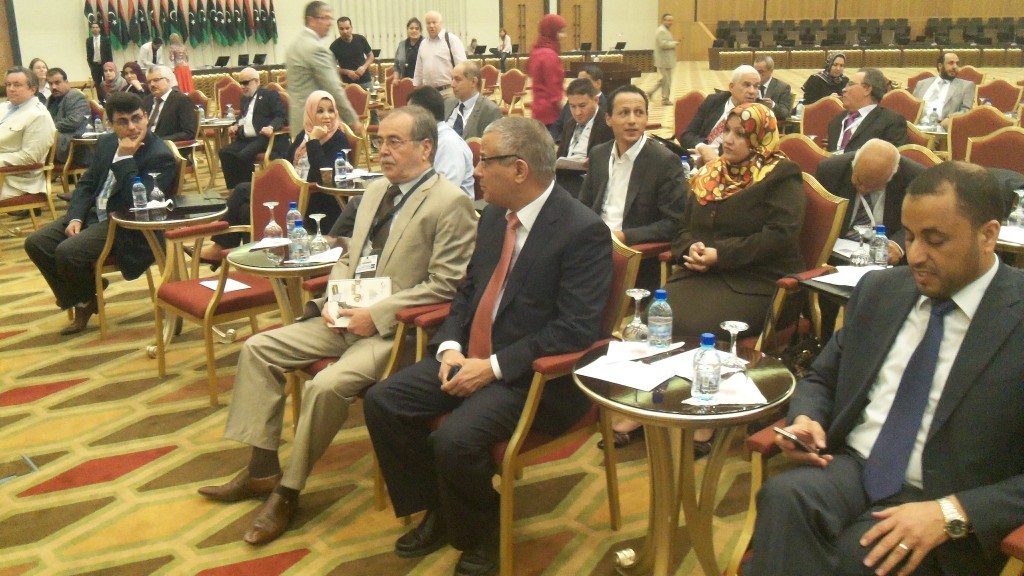By Nihal Zaroug.

Tripoli, 30 April 2013:
The General National Congress’ (GNC) Human Rights Committee held its first official meeting yesterday, aimed at . . .[restrict]promoting a culture of human rights in Libya.
Congresswoman Amina Megheirbi, also the head of the new Human Rights Committee, told the Libya Herald that a phased strategy would be needed, to foster a society that valued and lived by principles of human rights. “A plan involving various actors will be necessary over a long period of time,” she said.
Asked if the principles of human rights were being introduced into school curriculums, Megheirbi said this would be a “must” in the near the future. She added that this should be done at a very young age, to help fill the knowledge vacuum of over 40 years.
Addressing attendees, Megheirbi said promoting a culture of human rights would lead to the creation of a state based on the rule of law, an important aim of the revolution.
Other high-profile speakers at the conference delivered messages on the importance of human rights in Libya’s democratic transition.
Deputy President of the GNC, Jumaa Atigha, said that human rights were the foundation of all laws, without which “laws would have no legitimacy”. Human rights was the first line of defence, he said, and those who failed to understand its importance lacked knowledge.
Prime Minister Ali Zeidan held similar views, saying that human rights could not be superseded. “Without human rights no other laws could exist”, he said.
Both Atigha and Zeidan spoke of the necessity of dignity in moving forward. Depriving individuals of dignity would result in nothing, they said, referring to the recent incursions on the GNC and Ministries.
The forceful impositions of opinions and demands, made by armed individuals and groups, resulted in the stalling of work and progress, Zeidan said. Advocates of the Political Isolation Law had, on several occasions, attempted to force the passing of the law. Decisions would not be made under duress, said Zeidan. “Threatening members of the GNC is unacceptable,” he added.
The Prime Minister made an appeal to the public and those who fought for the revolution not to remain idle while “oppressors” challenged the aspirations of the 17 February Revolution and its path to democracy.
The government is not weak, said Zeidan, and the public must stand with the GNC – Libya’s highest elected body, and the government chosen by them. Responsibility to defend the revolution lay with “the people”, as governing bodies were transitional but society would always remain, said Zeidan.
Culture Minister Habib Al-Amin echoed Zeidan’s message by asking people to be unwavering against those who used force and showed no respect for individuals.
Al-Amin attributed the negativity present in society and the lack of regard for human rights, to ignorance. “We have all suffered. Why hurt others when you yourself have been hurt?” he said.
“Unless we change paths”, post-revolution Libya could become a “copy of the former regime”, Al-Amin warned.
Justice Minister Salah Marghani spoke of the need to address and compensate offences and pain suffered during the war. The stories of towns like Misrata and Tawergha, have not been heard, he said. “No dialogue has taken place, and the best remedy to ease the pain is to discuss it and prevent further abuses,” said Marghani.
Illegal detention and torture – “enemies of the 17 February Revolution” – must stop, Marghani said. Moving forward, and particularly after the passing of legislation against torture, kidnapping and discrimination, all prisons not currently under the control of the Misnistry of Justice would be viewed as being criminal and illegal, said Marghani.
Within the next couple of months, Marghani said, he hoped that plans devised by his ministry would take effect and act as a beacon: “The light at the end of a dark tunnel”.
[/restrict]








